Understanding the Power of Family in Overcoming Addiction
Addiction is a complex disease that profoundly impacts not only the individual but also their entire family system. Recognized as a 'family disease,' addiction can foster enabling behaviors and codependent relationships that sustain harmful cycles. Family therapy serves as a crucial intervention, offering a structured environment to foster understanding, improve communication, and promote healthier dynamics. This comprehensive approach addresses underlying issues and equips families with the tools needed to support recovery, breaking the cycle of enabling and codependency.
Enhancing Communication and Problem-Solving Skills through Family Therapy
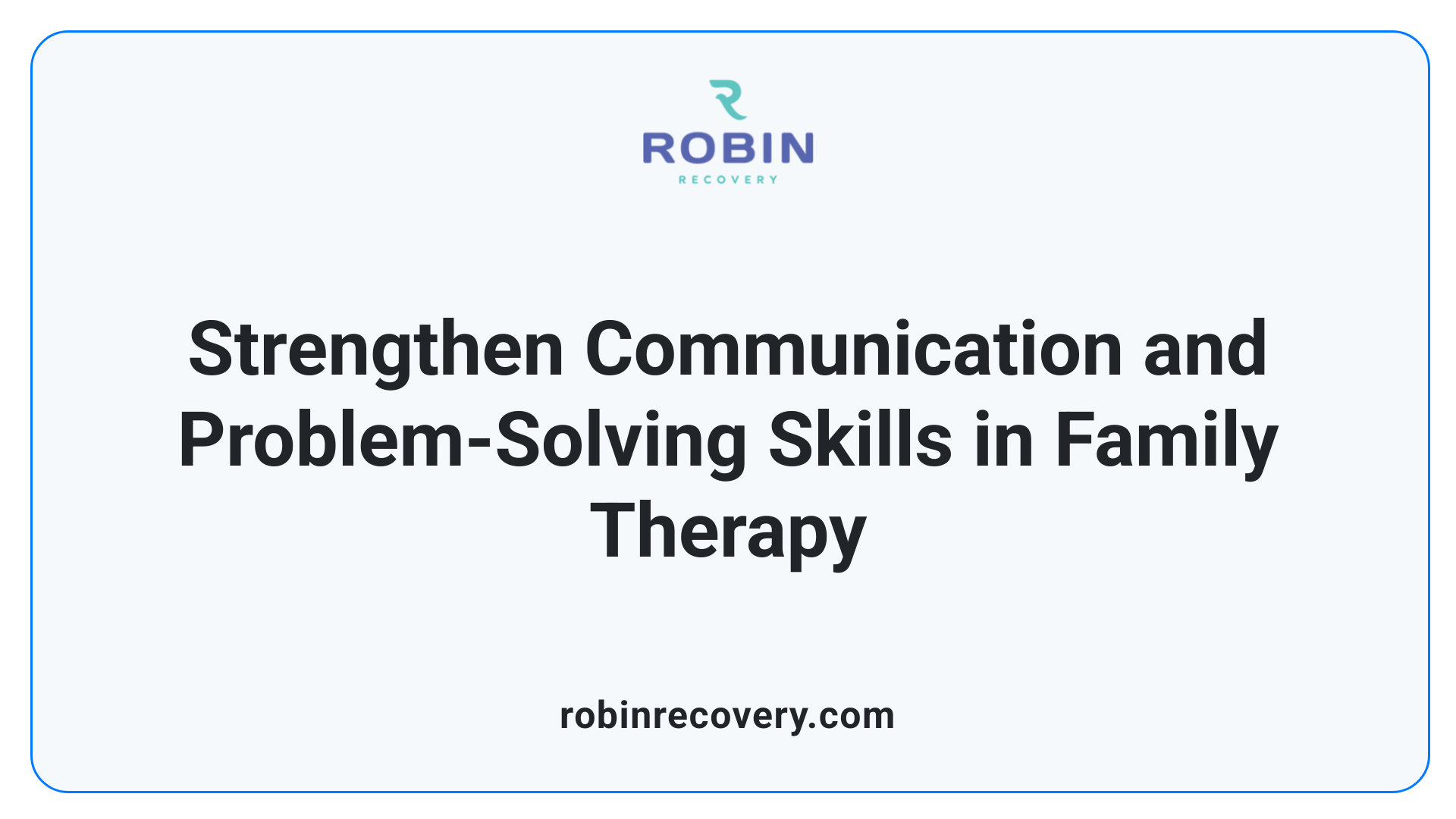
How does family therapy improve communication and problem-solving skills within families affected by addiction?
Family therapy plays a vital role in fostering better communication among family members dealing with addiction. It provides a safe, supportive environment where individuals can openly express their feelings, concerns, and frustrations without fear of judgment or conflict. This environment encourages empathy, understanding, and honest dialogue, which are essential for rebuilding trust and strengthening relationships.
A significant focus of family therapy is addressing dysfunctional patterns such as enabling behaviors and codependency. Enabling behaviors include actions like making excuses for the addicted loved one, covering up substance use, or providing financial support without accountability. These actions unintentionally sustain addiction. Family therapy educates members on recognizing these behaviors and setting healthy boundaries that promote accountability and self-responsibility.
To develop effective problem-solving skills, therapists often employ targeted techniques such as role-playing exercises and communication training. Role-playing allows family members to practice new ways of interacting, resolving conflicts, and expressing needs constructively. Structural restructuring techniques help families understand and modify the dynamics that contribute to ongoing problems, fostering healthier interactions.
Education about addiction itself is a core part of family therapy, enabling members to understand that addiction is a disease, not a moral failing. This understanding reduces blame and stigma, which can hinder open conversation and collaboration.
By learning to communicate effectively and address underlying relational issues, families become better equipped to support their loved ones' recovery. They develop a unified approach, reinforcing positive behaviors and emotional support, which are crucial for long-term success.
Ultimately, family therapy enhances problem-solving capabilities and communication skills, empowering families to confront challenges together and sustain the ongoing process of recovery and healing.
Recognizing Enabling Behaviors and Codependency in Family Settings
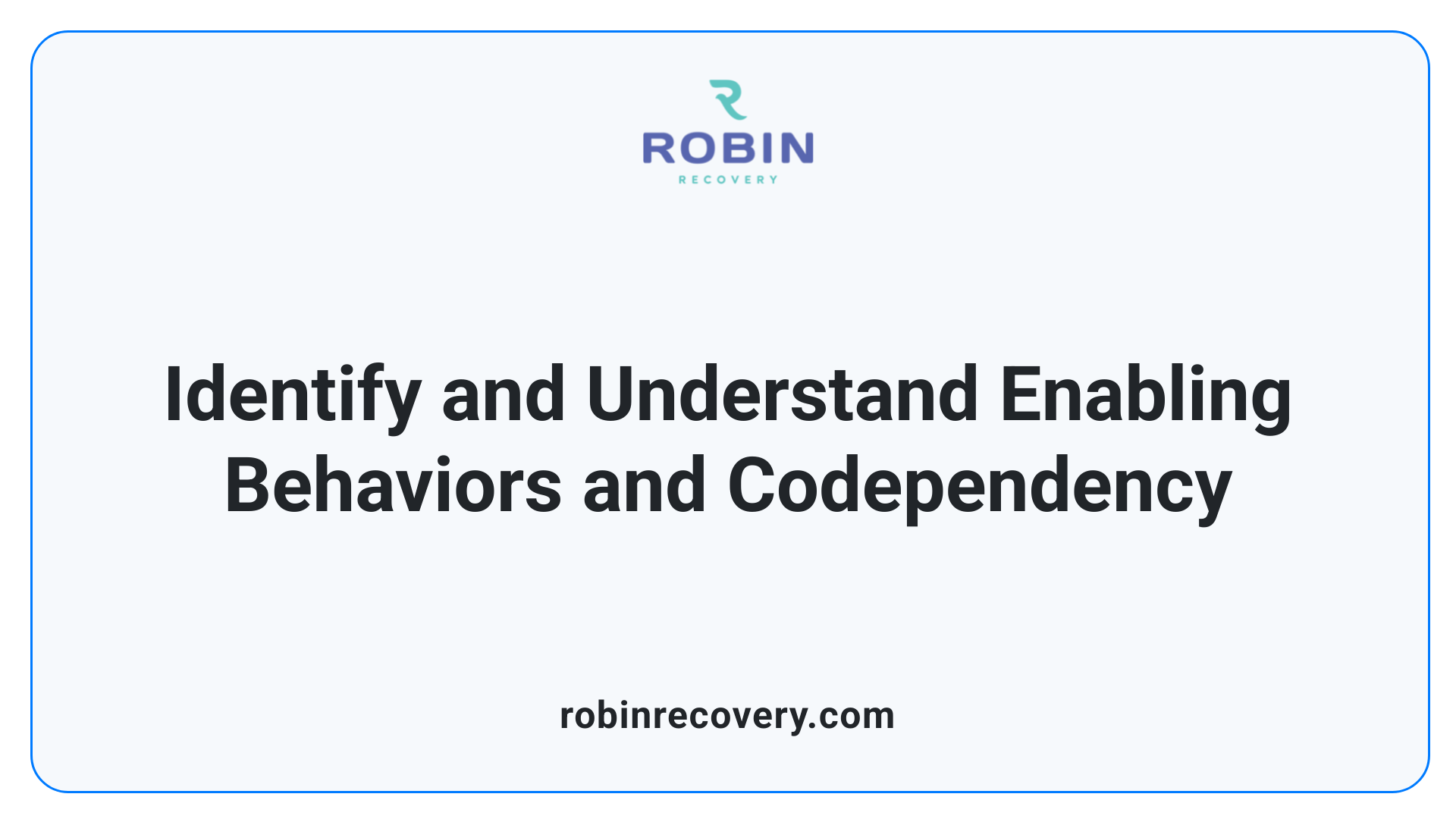
How can family members recognize enabling behaviors and codependency?
Family members can identify enabling actions by paying close attention to behaviors that inadvertently support or shield a loved one's problematic habits, such as substance use. These include making excuses for the individual's behavior, covering up issues to protect their reputation, or taking on responsibilities that rightfully belong to the person struggling with addiction.
Signs of codependency are often evident through patterns like difficulty setting and enforcing boundaries, excessive people-pleasing tendencies, and a low sense of self-worth. Such family members might prioritize the needs of the addicted individual over their own, often feeling responsible for the person’s actions and well-being. This excessive sense of responsibility can lead them to suppress their feelings or avoid confrontations to maintain peace.
Enabling behaviors are frequently driven by powerful emotions such as guilt, fear of losing the relationship, or a desire to prevent conflict. For example, a family member might provide financial support without requiring accountability, or they may ignore disturbing signs of addiction to suppress discomfort.
These patterns can become part of a broader cycle where the family member’s actions unintentionally sustain the addiction and prevent the individual from facing natural consequences that could motivate change. Early recognition of these behaviors is crucial. It allows families to establish healthier boundaries, foster open and honest communication, and support recovery efforts more effectively.
Understanding these dynamics also helps family members address underlying issues like emotional dependence or unspoken fears, ultimately promoting emotional healing and a supportive environment for the loved one's recovery. Interventions such as family therapy are instrumental in revealing these behaviors and guiding families towards healthier responses, breaking the cycle of enabling and codependency.
Addressing Enablement and Codependency in Family Therapy
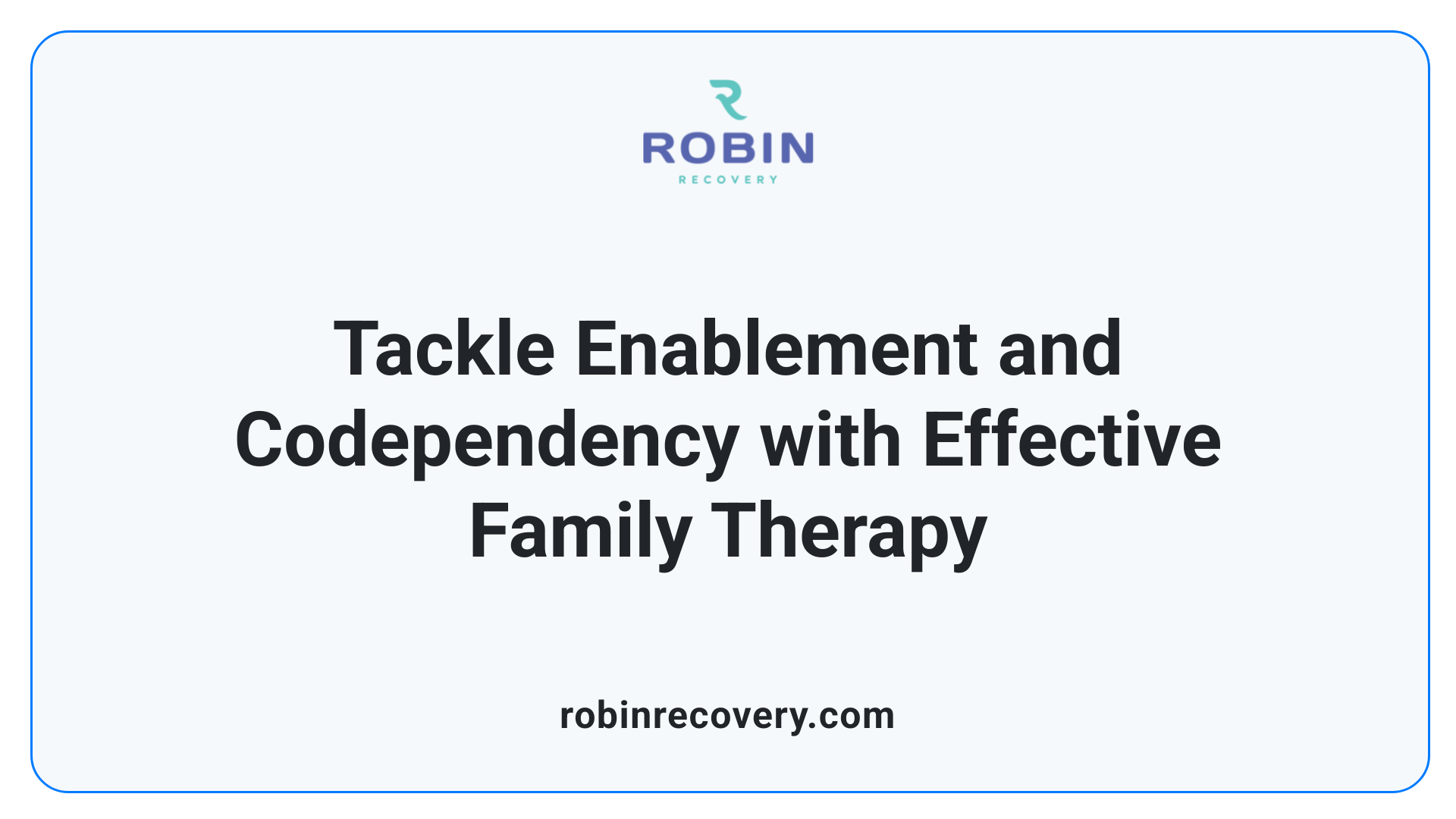
How does family therapy address enabling behaviors and codependency in families affected by addiction?
Family therapy plays a vital role in tackling enabling behaviors and codependency that often develop within families impacted by addiction. It begins with an educational component that helps family members understand the importance of establishing healthy boundaries. Many families unknowingly engage in patterns such as denial, over-sharing resources, or avoiding confrontation, which can inadvertently support the addict's continued substance use.
Through therapy, family members learn to recognize these damaging behaviors. For instance, they are guided to see how excessive caretaking or covering for the addicted loved one can prevent natural consequences from occurring, which diminishes the motivation for change.
To promote healthier dynamics, approaches like cognitive-behavioral therapy (CBT) and skills training are employed. These techniques teach effective communication, encourage accountability, and foster self-care practices among family members. By empowering them with tools to communicate openly without enabling substance use, therapy helps break the cycle of codependency.
An important aspect of family therapy is introducing support principles like detachment with love. This approach allows family members to maintain emotional connections while avoiding behaviors that enable addiction. It fosters a sense of compassion and understanding without sacrificing personal boundaries or well-being.
Addressing these patterns is crucial because enabling and codependency can hinder recovery by protecting dysfunctional behaviors and undermining the individual’s motivation to seek help. Family therapy not only educates but also facilitates the development of healthier relationships by reshaping roles, improving trust, and supporting sustainable recovery.
In conclusion, family therapy works to transform enabling and codependent behaviors through education, skill development, and strategic support, thus creating a nurturing environment conducive to long-term healing and sobriety.
Therapeutic Approaches and Intervention Strategies in Family Therapy
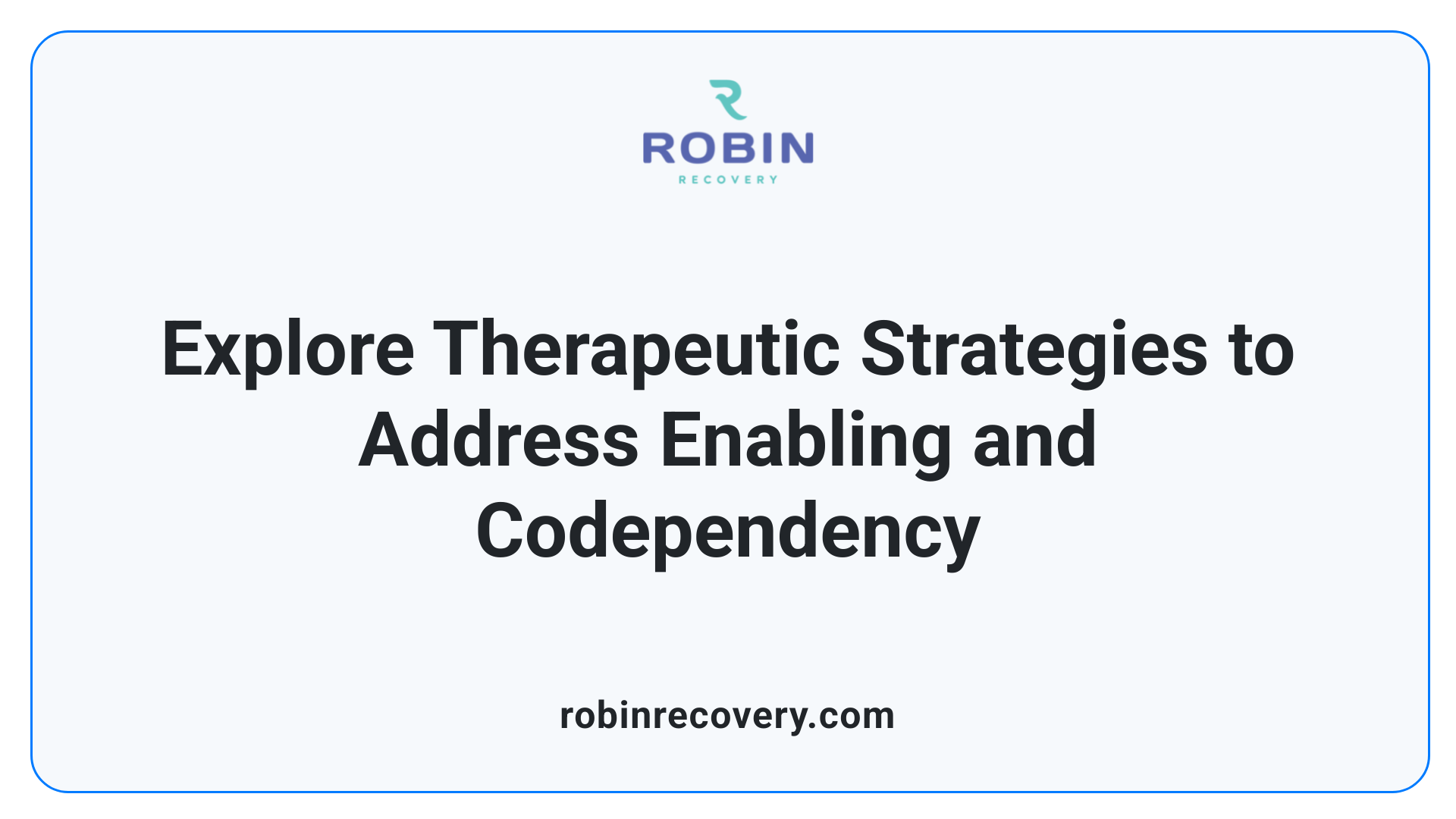
What therapeutic approaches and intervention strategies are used in family therapy to address enabling behaviors and codependency?
Family therapy employs a variety of approaches aimed at understanding and transforming the dynamics that sustain addiction, enabling behaviors, and codependency. These methods include well-established models such as the Family Systems, Structural Family Therapy, and the Family Disease Model. These models view the family as an interconnected system where each member’s behavior influences the others.
Therapists utilize specific techniques like joining, restructuring, reframing, enactment, and contracting to challenge dysfunctional patterns and promote healthier interactions. For instance, joining involves building rapport and trust within the family, while restructuring may include reorganizing family roles to foster positive change.
Specialized modalities further refine these strategies. Community Reinforcement and Family Training (CRAFT) empowers family members to detachment with love, effectively encouraging the addicted individual to seek help by focusing on positive reinforcement rather than enabling. Attachment-based family therapy helps improve the emotional bonds, reducing dependency behaviors.
Assessment tools such as genograms provide visual family trees that help identify historical patterns of addiction or enabling behaviors, while scales like the Enabling Behaviors Scale quantify tendencies that may support or hinder recovery. Recognizing these patterns enables targeted interventions focused on breaking cycles of codependency.
Family roles such as hero, martyr, and enabler often perpetuate dysfunctional family dynamics. Addressing these roles and modifying their influence are central to intervention efforts. Overall, these strategic approaches aim to improve communication, set healthy boundaries, and foster emotional connections conducive to recovery.
Which family therapy models and techniques are used to improve communication and resolve conflicts?
Several therapy models and techniques are applied to enhance family communication and resolve conflicts.
| Model/Technique | Description | How It Addresses Enabling and Codependency |
|---|---|---|
| Family Systems | Views the family as an interconnected unit | Identifies roles and patterns that sustain unhealthy behaviors |
| Structural Family Therapy | Restructures family interactions | Changes power dynamics and enforces boundaries |
| Family Disease Model | Recognizes addiction as affecting the entire family system | Addresses roles like enabler, hero, and scapegoat |
| Joining & Reframing | Therapists embed into the family system and alter perceptions | Builds trust and shifts dysfunctional narratives |
| Enactment | Families act out scenarios during sessions | Rehearses new communication skills |
| Contracting | Setting clear agreements | Supports accountability and boundary setting |
These techniques work together to create healthier family environments, reduce enabling behaviors, and promote accountability.
What specialized therapies and assessment tools are employed to support recovery?
Specialized therapies such as Emotionally Focused Therapy and attachment-based approaches are used to foster secure emotional bonds, which help reduce codependency and promote healing.
Assessment tools like genograms map out family history, revealing patterns of addiction and enabling behaviors. The Enabling Behaviors Scale helps measure tendencies that may contribute to ongoing issues.
These tools and therapies facilitate personalized treatment plans that address underlying trauma, emotional pain, and relational patterns, making the intervention more effective.
How do family roles and dysfunctional patterns contribute to sustaining addiction?
Family roles such as hero, martyr, scapegoat, and enabler are often maintained because they offer internal benefits, such as a sense of purpose or control.
These roles reinforce dysfunctional patterns where enablers support the addicted individual’s behavior, often out of love, concern, or fear.
Such patterns create a cycle that sustains addiction, impeding recovery efforts. Addressing and reshaping these roles through family therapy can break the cycle.
Understanding and changing these patterns is vital for long-term recovery. It involves educating family members about their roles and promoting healthier ways of relating.
| Dysfunctional Pattern | Impact on Addiction | Intervention Focus |
|---|---|---|
| Enabling | Supports continued substance use | Set boundaries, teach accountability |
| Codependency | Excessive reliance on the addict | Promote self-care, establish independence |
| Role perpetuation (hero, martyr) | Maintains family imbalance | Reassess roles, develop new family narratives |
By actively working on these dysfunctional dynamics, families can foster a supportive environment that encourages recovery and eliminates factors that perpetuate addiction.
Supporting Families to Manage Enabling Behaviors and Promote Recovery
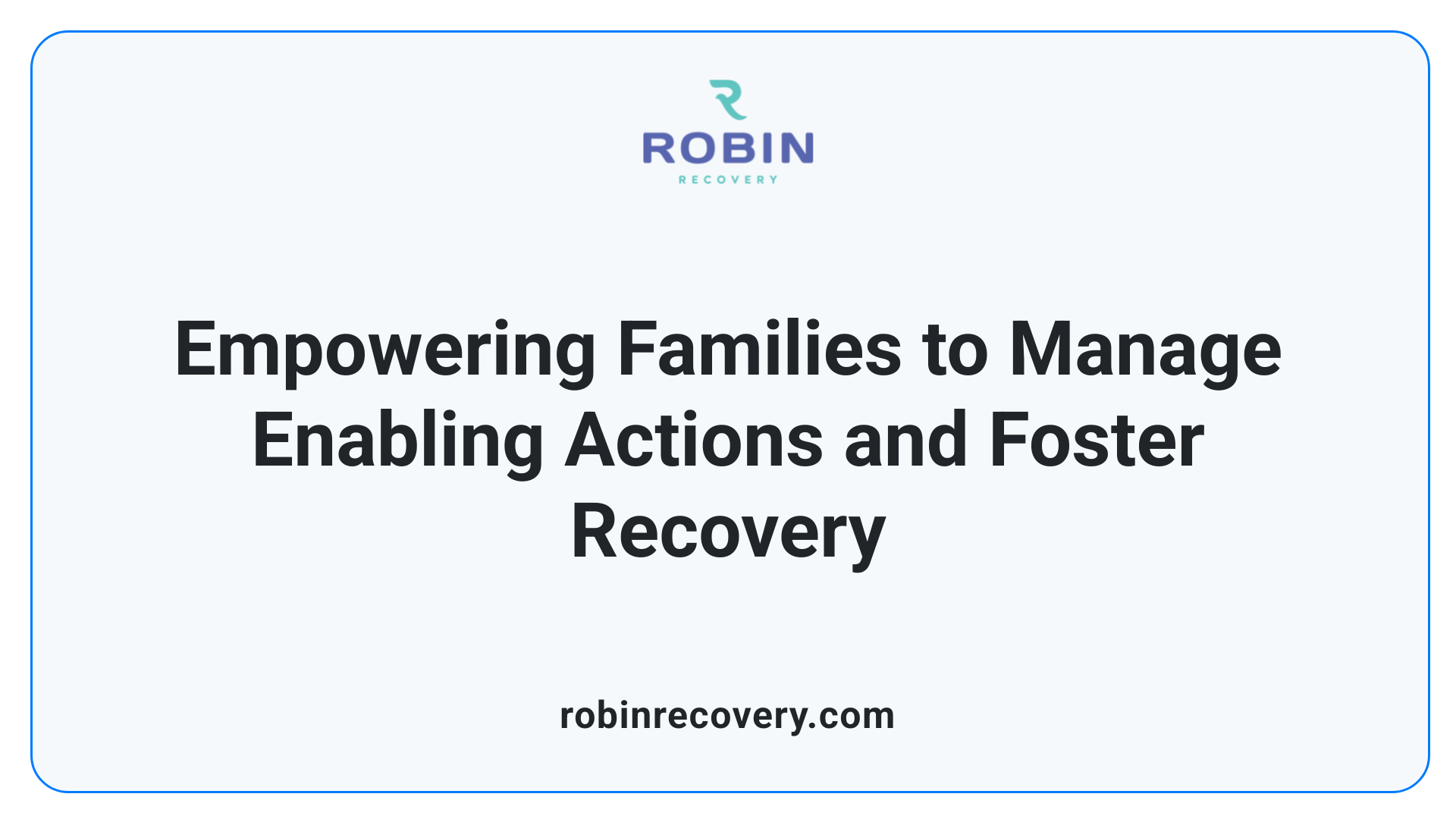
How does family therapy support families in managing enabling behaviors and codependency to facilitate recovery?
Family therapy plays a crucial role in helping families understand and change behaviors that inadvertently support addiction, such as enabling and codependency. It provides a structured environment where family members can learn about unhealthy patterns and reflect on their own actions.
Through guided sessions with qualified therapists, families explore how certain behaviors—like covering up for the loved one, making excuses, or protecting them from consequences—can reinforce addiction. Recognizing these actions is the first step towards change.
Therapists teach family members how to set healthy boundaries and promote accountability without blame or shame. This involves understanding the roots of codependency, which often stem from trauma, learned family roles like hero or enabler, or deep-seated emotional needs.
A key concept introduced in family therapy is emotional detachment with love. This approach encourages caring for the loved one while allowing natural consequences of their addiction to occur, fostering motivation for change.
Effective communication is another focus, empowering family members to express feelings and needs openly and constructively. Self-care strategies are also emphasized to help individuals maintain their emotional health.
By addressing these elements, family therapy reduces enabling behaviors and fosters healthier relationships. It helps shift reliance from dysfunctional roles to supportive, empowering interactions that underpin ongoing recovery.
In summary, family therapy provides the tools and insights necessary for families to break free from cycles of enabling and codependency. It creates a supportive environment where change can occur, ultimately supporting the recovered individual and strengthening family bonds.
Empowering Families for Lasting Recovery
Family therapy plays a vital role in addressing enabling behaviors and codependency, which are often barriers to successful addiction recovery. By fostering open communication, educating family members on healthy boundaries, and promoting self-care, therapy helps families break free from dysfunctional cycles. Through various evidence-based techniques and models, families learn to support their loved ones effectively while maintaining their own emotional well-being. The journey to recovery is a collaborative effort, and with the support of family therapy, families can rebuild trust, enhance support systems, and foster healthier relationships that lay the foundation for long-term sobriety and emotional resilience.
References
- Why Family Therapy for Addiction Matters
- The Importance of Family Therapy During Addiction ...
- Helping the Family | Codependent Behavior and Enabling ...
- Codependency and Enabling Behaviors
- How Codependency Affects Family Relationships - Avery Lane
- 8: Family Counseling Techniques
- Families of Addicts & How Intervention Can Help
- Supporting a Family Member Through Recovery
- How Family Therapy Can Help Overcome Addiction

.svg)

.svg)

.svg)
.svg)








































































































